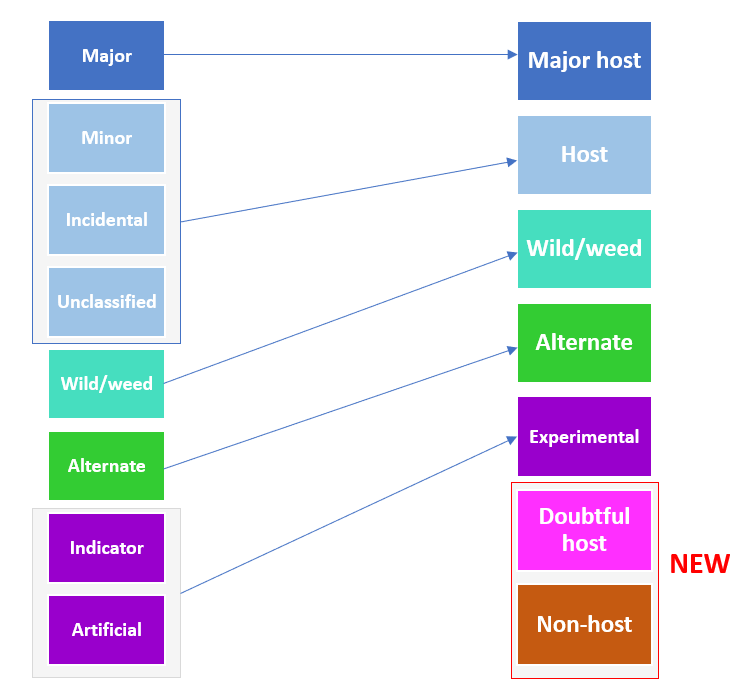Improvements on lists of host plants in EPPO Global Database
The EPPO Global Database (GD) is a freely accessible web-based database which is maintained by the EPPO Secretariat. The main objective of the database is to provide National Plant Protection Organizations of EPPO member countries with a rapid and easy access to all pest-specific information that has been produced or collected by EPPO. Major improvements to lists of host plants were initiated in 2019 with the preparation of more exhaustive host lists and addition of bibliographic sources to individual host plant records, and continued in 2020 with the simplification of host plant categories.
- Bibliographic sources
Since September 2019, references to scientific papers or other sources are given for host plant records, with the possibility to add notes to these references, such as ‘Confirmed host’, ‘Preferred host’ or any other useful comment (see for example https://gd.eppo.int/taxon/MELGMY/hosts). Concerning the past contents of GD, gaps are being filled gradually, and the EPPO Secretariat is making use of synergies between the datasheet revision project and the addition of new host plant data. About a third of the 15 000 records have been documented so far.
- Host categories:
Biological associations between a pest and a plant are complex, and there is no simple definition of what a host plant is. However fixed categories are necessary to be able to structure the information and retrieve it in a consistent way in the database. Since the early versions of the database (PQR in the 1980s), pest/host plant associations have been described by using eight categories. However, discussions in different EPPO Panels showed that some categories were not always understood. Since December 2020, categories have been simplified as follows:

- Major host (to replace ‘Major’): a host plant which is important for the pest, or on that plant the pest is considered to be important. This category is assigned by the EPPO Secretariat, resulting from a qualitative judgement, and using available information (e.g. the plant is frequently considered in the literature as an important host, significant damage is observed). The fact that the host status has been demonstrated (full cycle, Koch’s postulate completed) or that the plant is a preferred host (choice studies) will be indicated together with the bibliographic references whenever data is available.
- Host (to replace Minor – Incidental - Unclassified, as these categories were difficult to understand or to manage over time): the plant is listed as a host in the literature. The fact that it is a confirmed host, or a preferred host will be indicated together with the bibliographic references whenever data is available. Similarly, if the plant is only used by certain pest stages (adult/larval feeding) or has been shown to be a poor host (e.g. as used in nematology) this could also be indicated if known.
- Alternate (no change): for organisms which need distinct hosts to complete their life cycle (e.g. some aphids, some rusts).
- Wild/weed (no change): self-explanatory.
- Experimental (to replace Artificial and Indicator): only in inoculation studies or under laboratory conditions, no records of infestation in the field or the environment.
- Doubtful host (new): the information provided is weak or subject to controversy.
- Non-host (new): the plant has clearly been shown NOT to be a host. The main objective of this category is to be able to correct past errors, close controversy (similarly to the category ‘Absent, invalid record’ for geographical records in GD), or to be able to clearly state that a plant is not a host (sometimes important for trade).
Important note about the classification of host plants in GD: Categories are assigned by the EPPO Secretariat on the basis of available data at the time of entry. They correspond to a qualitative evaluation of the importance of the host plant for the pest concerned and remain indicative only.
Sources
EPPO (2021) EPPO Global Database (available online). https://gd.eppo.int
How to use the EPPO Global Database? General contents and search tips (2020) EPPO, Paris, 20 pp. Available at https://gd.eppo.int/media/files/general_user-guide.pdf
EPPO Secretariat (2021-02).
